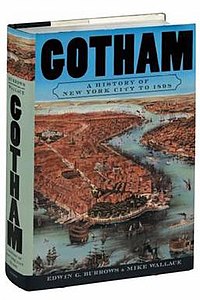Gotham: A History of New York City to 1898
 First edition cover | |
| Author | Mike Wallace Edwin G. Burrows |
|---|---|
| Language | English |
| Publisher | Oxford University Press |
Publication date | November 19, 1998 |
| Publication place | United States |
| Media type | Print (Hardcover) |
| Pages | 1416 |
| ISBN | 978-0-19-511634-2 |
Gotham: A History of New York City to 1898 is a non-fiction book by historians Edwin G. Burrows and Mike Wallace. Based on over twenty years of research, it was published in 1998 by Oxford University Press and won the 1999 Pulitzer Prize for History. Wallace is currently working on the second volume, which will cover New York City history through World War II.
The book was met with mostly laudatory reviews. In his review for The Atlantic, Timothy J. Gilfoyle called the book "the most comprehensive examination to date of the city's history prior to 1900," saying that "Gotham may rank in importance with the multi-volume works on Thomas Jefferson by Dumas Malone and on the Civil War by Allan Nevins,"[1] while Clyde Haberman in The New York Times wrote that "Burrows and Wallace offer a large-canvas portrait of a city they clearly love. ... [I]t marches relentlessly across the nearly three centuries from the Dutch landing to the emergence of the unified boroughs. The countless topics include, to list but a few, New York's wars with the Indians and its pro-Crown leanings, its financial support for the slave trade and its bloody draft riots during the Civil War, the commercial imperatives and the waves of immigration that constantly redefined it."[2] Publishers Weekly called the work "definitive."[3]
"Gotham" as a term for New York City was coined by Washington Irving in an 1807 November issue of his literary magazine, Salmagundi, based on the legends of the English village of Gotham, whose inhabitants are known for their folly.[4]
See also
- {{cite gotham}} to cite this book in other articles
References
Notes
- ^ Gilfoyle, Timothy J. (February 2002). "America's Heart". The Atlantic. Retrieved December 25, 2012.
- ^ Haberman, Clyde (December 13, 1998) "Goat's Town" The New York Times via the Wayback Machine (archived April 17, 2001)
- ^ Staff (November 2, 1998). "Nonfiction Review: Gotham: A History of New York City to 1898 by Edwin G. Burrows, Author, Mike Wallace, Joint Author Oxford University Press $65 (1416p) ISBN 978-0-19-511634-2". Publishers Weekly. Retrieved December 25, 2012.
- ^ Burrows, Edwin G. and Wallace, Mike (1999). Gotham: A History of New York City to 1898. New York: Oxford University Press. ISBN 0-195-11634-8. page xii


